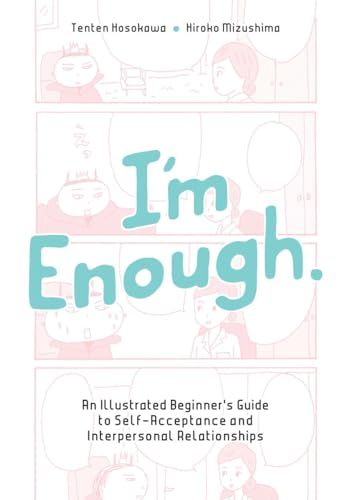12 years ago, I talked about a manga author named Tenten Hosokawa who wrote a manga called “My Significant Other Has Depression.” I loved how honest she was about clinical depression and how to best deal with it. 12 years later, I found out one of Hosokawa’s recent books got released here by Last Gasp Books.
I’m Enough: An Illustrated Beginner’s Guide to Self-Acceptance and Interpersonal Relationships is one of the best manga out there about mental health and hell, I should say an amazing mental health help book that’s better than a lot of mental health books.
The guide focuses on Hosokawa’s recent experiences dealing with negative emotions. She believes that she is the queen of negative thoughts due to her mother telling her to not feel anything positive during childhood. Hosokawa’s belief causes her life to go into a deep spiral where she feels like a failure no matter what she does. Hosokawa feels that she can’t change until she is recommended to meet with a psychiatrist named Dr. Hiroko Mizushima, who practices interpersonal therapy, a form of therapy that focuses on the power of interpersonal relationships to help improve one’s mental health. Together, both Hosokawa and Mizushima present ways on how to make peace with negative emotions, accept them for what they are, and grow from there.
The book is outlined in 3 major parts: Problems, Solutions, and Growth. The Problems part basically says that having negative thoughts is okay and how to utilize them to help those try to understand you better instead of just thinking negative emotions shouldn’t be expressed. The Solutions part addresses communication problems when it comes to interpersonal relationship disputes and dealing with role expectations. The Growth part focuses on the power of reflecting and changing one step at a time.
What I like is the structure of each part. Each part has several mini-chapters. Each mini-chapter starts in manga format with Hosokawa explaining how much they dislike whatever is bothering them and Mizushima providing solid reasoning and advice on how to move forward. Then it ends with a text section from Mizushima focusing on key points of the mini-chapter and what to do when it comes to a specific problem/solution.
What this book drives home is that it’s important to accept yourself for who you are. And that means accepting everything about yourself. Even the ugly parts. If a part of you feels that you might be, for example, a “whiny bitch”, accept that you are one. Only by accepting and acknowledging your present state can you actually start to figure out how to overcome whatever is ailing you mentally.
Another key point emphasized is how much people cause each other emotional pain. A lot of major mental health problems stem from those around us. Some of it can be from our loved ones, while some stem from acquaintances (i.e. workplace harassment). Most people try to solve these problems by communicating in ways that don’t help, like nonverbal body language and being silent and taking so much information in like a sponge. This ends up causing even more pain in your relationships.
And the last point is everyone’s trying their damn best to live their lives. This is the hardest part to learn. It’s way too easy to get caught up with how bad some people act towards you. But you know what, they can still change and grow slowly. You have to accept that to go along with accepting yourself. In fact, they go hand in hand. Changing for the better probably didn’t happen overnight for you, so why believe that others can do the same?
I feel that Mizushima’s approach is incredible because a lot of therapy focuses on changing the self a bit too much. She says we are highly impacted by the relationships those closest to us. If they’re great, we thrive. If they’re terrible, we will falter. A lot of trauma revolves around terrible relationships with people who we thought were supposed to help us, but didn’t. Therapy sometimes ignores this. Also, psychiatry often tells us to take medication and that should be all. While some medication is fine, it should never be the whole solution.
I can personally tell you how much self-acceptance has saved me. I only wished I learned it sooner. While there were struggles at times over how I feel like I haven’t accomplished much, I’m slowly learning to tell myself that I’m enough. I’m going out there. I’m living. I may not be living life like a social media darling, but hey, I’m doing okay and that’s enough for me. Maybe I’m a silly dork or overthink things; I’ve accepted that and somehow don’t get too caught up in those things. Hosokawa and Mizushima’s work is a much-needed resource for those who truly understand that we’re all interdependent on one another to get out of whatever mental hellholes we get caught in.
I wholeheartedly recommend I’m Enough. Everyone’s rushing to be great all the time or everyone’s feeling like they’re the worst people in the world. There’s no middle ground. I want people to be able to accept themselves through the help of others. And to admit that a grand truth of life is that things are often personal – very interpersonal.
